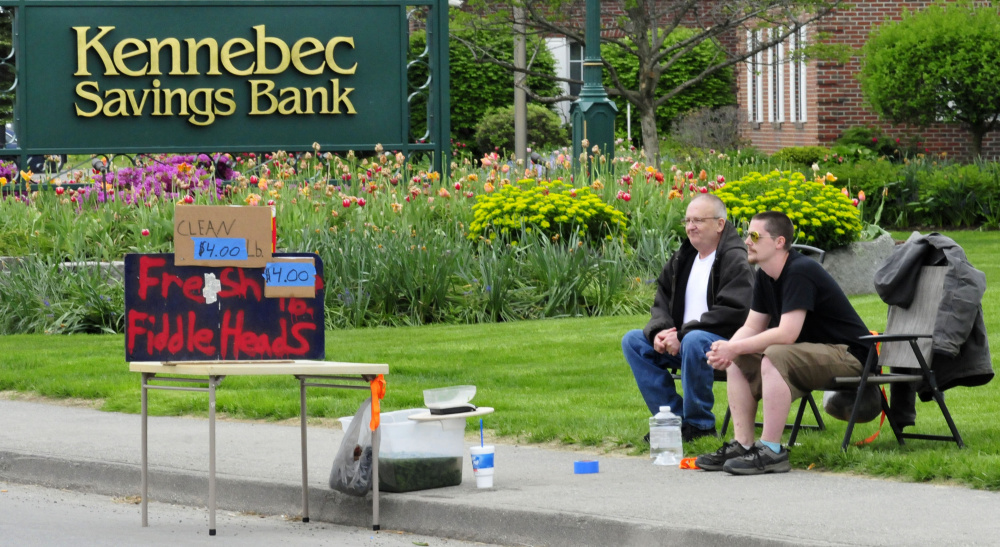Shaun Caron won’t brag and say he knows everything there is to know about fiddleheads, but he’s darned close to being an expert, at least in my view.
Caron, 30, is a fourth-generation fiddlehead picker who sells them on the street in Waterville from about the first of May when he starts picking to just after the first of June when the season ends.
“My family’s been doing this since my French ancestors came down from Canada,” he said. “My great-grandmother learned how to blanch them and freeze them. It’s not difficult to learn how to do it. It’s difficult to learn how to perfect the blanching technique. My grandmother lived on the Kennebec River, on Water Street, and all she had to do was go out back, right down to the river, and pick them. That helped the family a lot. They used to pick a lot and can them and blanch and freeze them.”
Caron sat in a folding chair on Main Street Thursday morning, a large plastic tote box next to him full of water and plump green fiddleheads. A card table was set up next to it with a sign advertising $4 a pound. With Caron was 59-year-old Dan Hamilton, a friend who helps Caron and his fiancee, Candace Ferguson, pick fiddleheads.
The picking season has been pretty good this year, though in the Waterville area the fiddleheads weren’t perfect because of the rain and some flooding, according to Caron.
“What happened was, the water took so long to recede, they were really small. That kind of messed up the picking here, so I had to go west and north. My fiancee’s stepmother and father picked over 4,000 pounds this year. They shipped them right out of state to Massachusetts and Connecticut. There, they get $12 to $20 a pound.”
When Caron picks fiddleheads around the Waterville area early in the season, he charges $3 a pound, but then he has to follow the fiddleheads as they grow. When he travels to Unity and Albion to pick, he increases the price to $3.50.
“And when I have to go to Farmington, Wilton and Abbot, I go to $4 a pound. I’ve probably got another week-and-a-half of picking if I continue to go north and west.”
It is backbreaking work but worth it, as Caron averages 1,500 to 2,000 pounds a season and says he can make $100 in three hours.
“It’s tedious trying to find fiddleheads, and bending over, unless you’re in a good spot, like my spots that are hidden in the woods. Trying to find them is the hardest part. You’ve got to have a water source. It can’t be super wet, but it can’t be too dry, and if you can find any that grow in or around sand, they’re super size. The incubation of it is insane. They become monsters.”
But that is a good thing — people love them, he said.
“You want big fiddleheads. I average around a 1 1/2-inch stem. Some people like stem, but some people only like the head of the fiddle. Some people come in and say, ‘I don’t want to pay $4 a pound because there’s too much stem.'”
There are a lot of ways to eat fiddleheads. Some people steam them and sprinkle them with vinegar, salt and pepper; some cook them with garlic; and others use them in salads or as a green vegetable in casseroles, according to Caron, who has his own favorite fiddlehead dish.
“The only way I’ll eat them is cook up some B&M beans, steam the fiddleheads, chop up franks and cook them and then mix everything all together. People who have never had them ask me, ‘What’s the flavor of fiddleheads?’ The only thing I can say is if you’ve ever had spinach, it’s kind of similar but better than spinach, if you ask me.”
Caron is the ultimate fiddlehead entrepreneur. He invented a special wash station to clean them, using electric fans, a grate, water and chicken wire.
“It makes it easier to clean, if you have major poundage of fiddleheads,” he said.
He follows a fiddleheading regimen, which he has perfected over 15 years.
“I like to leave before the sun comes up, get to where I’m going right before dawn, get into the woods, pick till the sun goes down, go home, clean them all and I’ll be out here the next morning, selling. I try to get my fiddleheads to my customers within 24 hours of picking them. I’m very big on the quality. I don’t want to give people bad stuff. I don’t want people pushing legislation that proposes we get a permit to pick, a permit to sell and take a 30-hour course on fiddlehead safety. I don’t need a 30-hour course.”
Caron works for landlords doing building maintenance when he’s not fiddleheading. The jobs help to pay the bills as he has a 4-year-old daughter, Kylie, in addition to his fiancee.
As he speaks, his cell phone rings and it’s someone from Troy who wants five pounds, he said. He has loyal customers who come back year after year. Caron advertises his fiddleheads on social media and does well with that. Next year, he’ll improve the sales part of the business even more, he said.
“My goal for next year is, I want to get a card reader so I can go debit. The last three years or so everyone’s been asking if I take debit cards, so I think that’s going to be my next investment.”
The business is like any other in that it depends on circumstances, such as the weather.
“Last season we had an excellent start, and then it seemed like the entire part of central Maine got hit with frost. That’ll end the season — frost will end the season.”
Caron is proud of his work and the fiddleheads he sells. Unlike other vendors who sell them in pre-packed plastic bags, he keeps them in water so they stay fresh until the customer comes by, and then he puts them on the scale to weigh them before placing them in a bag.
“Every time I’ve ever had anybody stop, they always compliment me on how clean they are. I’m not trying to brag, but I think we have the best washing station, for sure — and the best fiddleheads.”
Amy Calder has been a Morning Sentinel reporter for 29 years. Her column appears here Mondays. She may be reached at acalder@centralmaine.com. For previous Reporting Aside columns, go to centralmaine.com.
Send questions/comments to the editors.




Comments are no longer available on this story